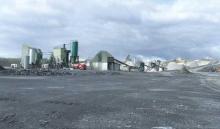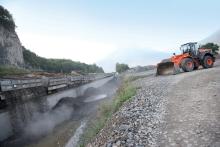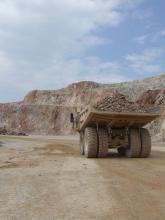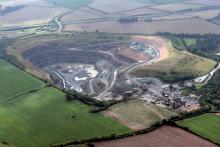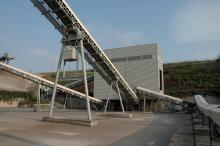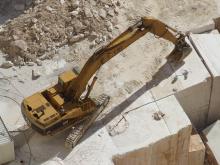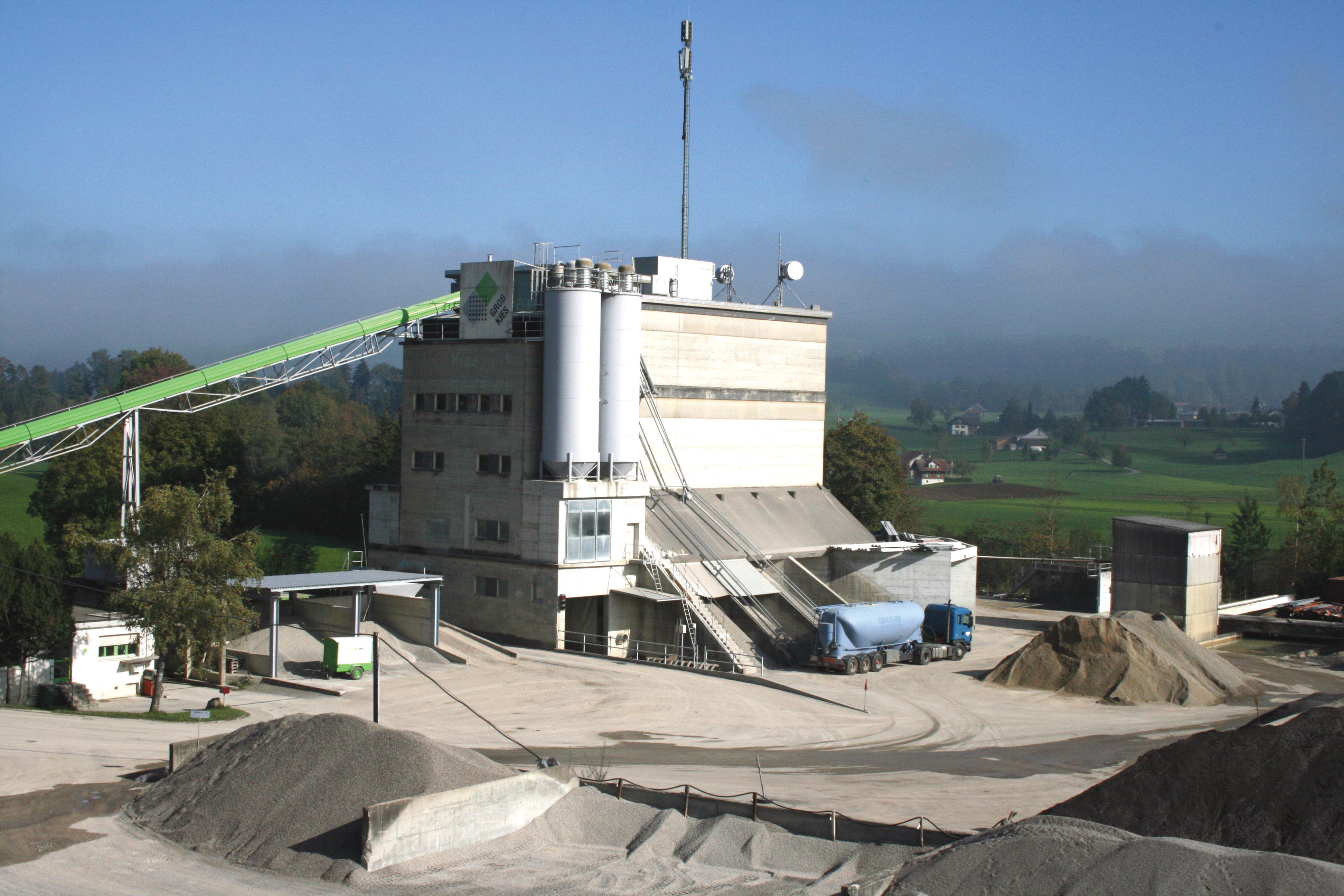
Switzerland's Grob Kies may be a small quarry operators but the company's heritage proves that even SMEs can lead the way on setting environmental standards. Claire Symes reports
Think of Switzerland and peaceful images of cows with bells grazing lush pastures against a back drop of snow capped peaks may come to mind. While this may be the image presented to tourists, Switzerland still has a growing construction market with a need for raw materials.
To ensure Switzerland retains its green image for future generations, the country has some of the toughest environmental regulations in Europe. Nonetheless, one family owned quarry operator,
Grob Kies was set up by Jacques Grob in 1867 as part of an enterprise which included a restaurant and agricultural interests as well as some aggregate extraction. But it was the company's agricultural link that gave it the impetus to restore exhausted quarries for reuse for farming.
The company has been passed down the generations from Jacques to his son Walter, to his son Jacques and is now managed by the first Jacques Grob's Great grandson who is also called Jacques.
"The company was quite small, until after World War II with just five or 10 employees," explained the youngest Jacques Grob, who took over management of the company in 1975. "But it was my Father who industrialised the company and moved it more firmly into the quarrying business." Since Grob took over ownership of the company in the mid-1970s he has expaned it to an enterprise which produces 250,000tonnes of aggregates each year, of which around 10% is recycled aggregates. The aggregates business now employs 40 people and operates three plants and Grob Kies also owns a successful construction company with 120 employees.
Grob Kies' extracts around 120,000tonne of gravel from Bütschwil quarry, which is also home to the company's state of the art processing and concrete plant. The plant, which is fully enclosed to reduce both noise and dust, takes material from the company's other two quarries at Nassen and Degersheim.
According to Grob, the company's business is focused on gravel and conglomerate extraction because most of the hard rock resources in the region lie within more touristic mountain areas.
"The Bütschwil business has been in the hands of Grob Kies for many years but we acquired Nassen and Degersheim in the 1980s as part of the company's expansion," said Grob. It was also in the 1980s when Grob moved the company into the construction sector. "We bought out a contractor called Pozzi in 1987 to verticalise the company and give our products their own market," explained Grob.
More recently in 2006, Grob Kies has added Slongo, another construction contract, to the portfolio in a bid to expand its business in eastern Switzerland.
The company's aggregates business operates within a 40km radius of the town of St Gallen, which is an hour's drive north east from Zurich. Grob claims that the company has around an 80% market share in the region. "The markets in Swtizerland are very small but our main competitor is
Environment
But throughout its growth period, environmental concerns have stayed central to the way the company operates. "Grob Kies has a long tradition of sustainability and it is not just the effect of a new initiative but a story as long as the company's history," explained Grob. "We have always been careful with nature and my Father learnt that working with our local partners was important. To ensure we retain a good name in the region and can continue to expand our business, it is essential that we give back the land in good condition, so restoration is not a new concept to the company." The company has also been a trend-setter in Switzerland in the drive to meet new standards - it has been ISO-certified for quality, environment and health and safety since 1997. The company has also never failed an audit since they were introduced by the Swiss aggregates association - Fachverband der Schweizerischen Kies und Betonindustrie (FSKB) - in 1975.
It was this long standing commitment that brought the company European-wide recognition in this year's European Aggregates Association's (
According to the UEPG, Grob Kies commitment to biological diversity can be seen on two levels: measures during the extraction activity, and the restoration of habitats.
The judges for the award were particularly impressed by the designation of Gob Kies' Degersheim extraction site as an amphibian spawning area. The company's work in the Bräägg and Letzi to restore and protect the river landscapes of the Thur and Necker were also commended.
"We were very pleased to win the award," said Grob. "For a small company like ours to be in the lead in this important area was a real highlight for us and a great achievement." In addition to its work with the environment, Grob Kies also works hard to develop and maintain a good relationship with the local residents and business communities.
"We hold open days for local people to allow them to visit our sites and view the operations and develop more understanding," said Grob. "We also sponsor local sporting and cultural events."
In the blood
It is hardly any surprise that Grob, who is also president of the FSKB, is passionate about his work - he lives and breathes quarries and was always destined to work in the family business. Some of his earliest memories are from being at the quarry with his Father and watching the extraction process at close hand.
"I spent most of my school holidays working in the quarry," said Grob. "I think I learnt to drive a truck before I learnt to drive a car and was operating wheeled loaders from the age of 10." Grob joined the company straight from school at the age of 16 in 1970. He worked on every aspect of the production process from operating the machines in the quarry to managing the processing plants.
He left the company briefly to start studying for a degree in economics at a local university but returned to assist his Father. "I was the eldest and my brother and sisters were not interested in the business, so it was up to me to take over management in the company from my Father in 1975," he said. "Although he retired from running the company, my Father continued working in the quarry as a truck driver until he was 84." Since the mid-1970s Grob has managed and developed the company single-handedly and finally bought out his sibling's shares in Grob Kies in 2001 to avoid the business being consolidated into a larger company.
Challenge
Grob Kies currently has reserves for the next 30 to 40 years but Grob is continually working to ensure the company gains permission for new sites well ahead of demand. "It can be very difficult to get consent for new quarries in Switzerland," said Grob. "The land owners are usually farmers so it is not possible to buy the land, so we have to negotiate a rental agreement but many farms in the region are small - around 10ha - so we need to gain agreement from about 10 land owners before extraction is viable.
"Then sorting out the transportation issues and emissions is the next hurdle that needs to be tackled. It is the government which presents the most problems, rather than NGOs. We have worked closely with NGOs in the past on creating wildlife solutions through restoration, so they understand our respect for the environment.
"But even with the understanding of our business and ways of working, gaining consent can still take around 10 years. In the past, some sites have taken 25 years to go from initial enquiries to actually extracting any aggregate." Nonetheless, Grob Kies has recently extended its reserves with the granting of permission to open a new quarry close the Bütschwil site. Initially, the company plans to extract around 50,000tonnes of conglomerate each year from the site but Grob said that this volume will increase after a few years.
Next generation
With further reserves in place to ensure the future of the company, Grob has also been working to develop the company for the next generation of the family. Grob has just established a holding company for Grob Kies to ensure that the company stays within the family when he retires. Grob has four children - two of whom already work for the company - and the new trust will help him pass the company onto the next generation.
"I worked hard to keep the company in the family after my brother and sisters wanted to sell their part of the business," he said. "Following setting up of the holding company, I effectively become a caretaker for Grob Kies until my children are ready to take over. When they do, they can sell the company but only if they all agree - none of them can insist the others buy them out as happened to me. I hope this agreement will help keep the business in the family for many more generations." But Grob has not pushed any of his children to work for the company. His son has worked as a mechanic on the plants for a number of years, whereas his eldest daughter only joined the company in April this year after working as a private banker for 10 years. His other daughters are currently working and studying elsewhere.
"It is their choice whether they work directly for the company in the future but now we have the holding company in place, the future of the company will be theirs to decide."

